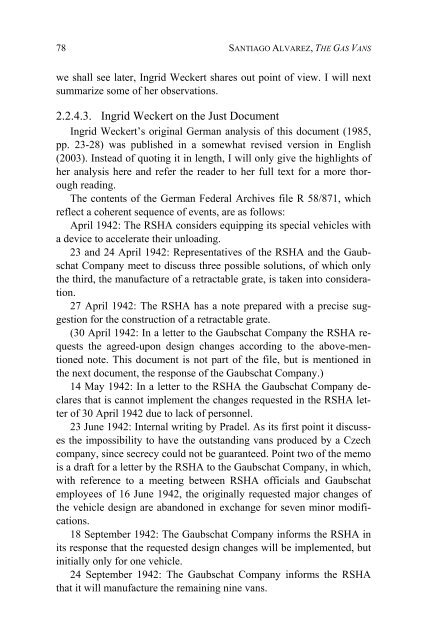- Page 1 and 2:
BARNES REVIEW HOLOCAUST HANDBOOK SE
- Page 4 and 5:
BY SANTIAGO ALVAREZ WITH MAJOR CONT
- Page 6 and 7:
SANTIAGO ALVAREZ, THE GAS VANS 5 Co
- Page 8 and 9:
SANTIAGO ALVAREZ, THE GAS VANS 7 3.
- Page 10:
SANTIAGO ALVAREZ, THE GAS VANS 9 Ap
- Page 13 and 14:
12 SANTIAGO ALVAREZ, THE GAS VANS a
- Page 15 and 16:
14 SANTIAGO ALVAREZ, THE GAS VANS L
- Page 17 and 18:
16 SANTIAGO ALVAREZ, THE GAS VANS A
- Page 19 and 20:
18 SANTIAGO ALVAREZ, THE GAS VANS t
- Page 21 and 22:
20 SANTIAGO ALVAREZ, THE GAS VANS c
- Page 23 and 24:
22 SANTIAGO ALVAREZ, THE GAS VANS m
- Page 25 and 26:
24 SANTIAGO ALVAREZ, THE GAS VANS 1
- Page 27 and 28: 26 SANTIAGO ALVAREZ, THE GAS VANS 1
- Page 29 and 30: 28 SANTIAGO ALVAREZ, THE GAS VANS T
- Page 31 and 32: 30 SANTIAGO ALVAREZ, THE GAS VANS i
- Page 33 and 34: 32 SANTIAGO ALVAREZ, THE GAS VANS s
- Page 35 and 36: 34 SANTIAGO ALVAREZ, THE GAS VANS t
- Page 37 and 38: 36 SANTIAGO ALVAREZ, THE GAS VANS g
- Page 39 and 40: 38 SANTIAGO ALVAREZ, THE GAS VANS e
- Page 41 and 42: 40 SANTIAGO ALVAREZ, THE GAS VANS 2
- Page 43 and 44: 42 SANTIAGO ALVAREZ, THE GAS VANS s
- Page 45 and 46: 44 SANTIAGO ALVAREZ, THE GAS VANS
- Page 47 and 48: 46 SANTIAGO ALVAREZ, THE GAS VANS m
- Page 49 and 50: 48 SANTIAGO ALVAREZ, THE GAS VANS t
- Page 51 and 52: 50 SANTIAGO ALVAREZ, THE GAS VANS T
- Page 53 and 54: 52 SANTIAGO ALVAREZ, THE GAS VANS b
- Page 55 and 56: 54 SANTIAGO ALVAREZ, THE GAS VANS p
- Page 57 and 58: 56 SANTIAGO ALVAREZ, THE GAS VANS c
- Page 59 and 60: 58 SANTIAGO ALVAREZ, THE GAS VANS e
- Page 61 and 62: 60 SANTIAGO ALVAREZ, THE GAS VANS 2
- Page 63 and 64: 62 SANTIAGO ALVAREZ, THE GAS VANS T
- Page 65 and 66: 64 SANTIAGO ALVAREZ, THE GAS VANS 2
- Page 67 and 68: 66 SANTIAGO ALVAREZ, THE GAS VANS f
- Page 69 and 70: 68 SANTIAGO ALVAREZ, THE GAS VANS t
- Page 71 and 72: 70 SANTIAGO ALVAREZ, THE GAS VANS I
- Page 73 and 74: 72 SANTIAGO ALVAREZ, THE GAS VANS c
- Page 75 and 76: 74 SANTIAGO ALVAREZ, THE GAS VANS w
- Page 77: 76 SANTIAGO ALVAREZ, THE GAS VANS d
- Page 81 and 82: 80 SANTIAGO ALVAREZ, THE GAS VANS T
- Page 83 and 84: 82 SANTIAGO ALVAREZ, THE GAS VANS -
- Page 85 and 86: 84 SANTIAGO ALVAREZ, THE GAS VANS I
- Page 87 and 88: 86 SANTIAGO ALVAREZ, THE GAS VANS q
- Page 89 and 90: 88 SANTIAGO ALVAREZ, THE GAS VANS h
- Page 91 and 92: 90 SANTIAGO ALVAREZ, THE GAS VANS -
- Page 93 and 94: 92 SANTIAGO ALVAREZ, THE GAS VANS f
- Page 95 and 96: 94 SANTIAGO ALVAREZ, THE GAS VANS S
- Page 97 and 98: 96 SANTIAGO ALVAREZ, THE GAS VANS h
- Page 99 and 100: 98 SANTIAGO ALVAREZ, THE GAS VANS
- Page 101 and 102: 100 SANTIAGO ALVAREZ, THE GAS VANS
- Page 103 and 104: 102 SANTIAGO ALVAREZ, THE GAS VANS
- Page 105 and 106: 104 SANTIAGO ALVAREZ, THE GAS VANS
- Page 107 and 108: 106 SANTIAGO ALVAREZ, THE GAS VANS
- Page 109 and 110: 108 SANTIAGO ALVAREZ, THE GAS VANS
- Page 111 and 112: 110 SANTIAGO ALVAREZ, THE GAS VANS
- Page 113 and 114: 112 SANTIAGO ALVAREZ, THE GAS VANS
- Page 115 and 116: 114 SANTIAGO ALVAREZ, THE GAS VANS
- Page 117 and 118: 116 SANTIAGO ALVAREZ, THE GAS VANS
- Page 119 and 120: 118 SANTIAGO ALVAREZ, THE GAS VANS
- Page 121 and 122: 120 SANTIAGO ALVAREZ, THE GAS VANS
- Page 123 and 124: 122 SANTIAGO ALVAREZ, THE GAS VANS
- Page 125 and 126: 124 SANTIAGO ALVAREZ, THE GAS VANS
- Page 127 and 128: 126 SANTIAGO ALVAREZ, THE GAS VANS
- Page 129 and 130:
128 SANTIAGO ALVAREZ, THE GAS VANS
- Page 131 and 132:
130 SANTIAGO ALVAREZ, THE GAS VANS
- Page 133 and 134:
132 SANTIAGO ALVAREZ, THE GAS VANS
- Page 135 and 136:
134 SANTIAGO ALVAREZ, THE GAS VANS
- Page 137 and 138:
136 SANTIAGO ALVAREZ, THE GAS VANS
- Page 139 and 140:
138 SANTIAGO ALVAREZ, THE GAS VANS
- Page 141 and 142:
140 SANTIAGO ALVAREZ, THE GAS VANS
- Page 143 and 144:
142 SANTIAGO ALVAREZ, THE GAS VANS
- Page 145 and 146:
144 SANTIAGO ALVAREZ, THE GAS VANS
- Page 147 and 148:
146 SANTIAGO ALVAREZ, THE GAS VANS
- Page 149 and 150:
148 SANTIAGO ALVAREZ, THE GAS VANS
- Page 151 and 152:
150 SANTIAGO ALVAREZ, THE GAS VANS
- Page 153 and 154:
152 SANTIAGO ALVAREZ, THE GAS VANS
- Page 155 and 156:
154 SANTIAGO ALVAREZ, THE GAS VANS
- Page 157 and 158:
156 SANTIAGO ALVAREZ, THE GAS VANS
- Page 159 and 160:
158 SANTIAGO ALVAREZ, THE GAS VANS
- Page 161 and 162:
160 SANTIAGO ALVAREZ, THE GAS VANS
- Page 163 and 164:
162 SANTIAGO ALVAREZ, THE GAS VANS
- Page 165 and 166:
164 SANTIAGO ALVAREZ, THE GAS VANS
- Page 167 and 168:
166 SANTIAGO ALVAREZ, THE GAS VANS
- Page 169 and 170:
168 SANTIAGO ALVAREZ, THE GAS VANS
- Page 171 and 172:
170 SANTIAGO ALVAREZ, THE GAS VANS
- Page 173 and 174:
172 SANTIAGO ALVAREZ, THE GAS VANS
- Page 175 and 176:
174 SANTIAGO ALVAREZ, THE GAS VANS
- Page 177 and 178:
176 SANTIAGO ALVAREZ, THE GAS VANS
- Page 179 and 180:
178 SANTIAGO ALVAREZ, THE GAS VANS
- Page 181 and 182:
180 SANTIAGO ALVAREZ, THE GAS VANS
- Page 183 and 184:
182 SANTIAGO ALVAREZ, THE GAS VANS
- Page 185 and 186:
184 SANTIAGO ALVAREZ, THE GAS VANS
- Page 187 and 188:
186 SANTIAGO ALVAREZ, THE GAS VANS
- Page 189 and 190:
188 SANTIAGO ALVAREZ, THE GAS VANS
- Page 191 and 192:
190 SANTIAGO ALVAREZ, THE GAS VANS
- Page 193 and 194:
192 SANTIAGO ALVAREZ, THE GAS VANS
- Page 195 and 196:
194 SANTIAGO ALVAREZ, THE GAS VANS
- Page 197 and 198:
196 SANTIAGO ALVAREZ, THE GAS VANS
- Page 199 and 200:
198 SANTIAGO ALVAREZ, THE GAS VANS
- Page 201 and 202:
200 SANTIAGO ALVAREZ, THE GAS VANS
- Page 203 and 204:
202 SANTIAGO ALVAREZ, THE GAS VANS
- Page 205 and 206:
204 SANTIAGO ALVAREZ, THE GAS VANS
- Page 207 and 208:
206 SANTIAGO ALVAREZ, THE GAS VANS
- Page 209 and 210:
208 SANTIAGO ALVAREZ, THE GAS VANS
- Page 211 and 212:
210 SANTIAGO ALVAREZ, THE GAS VANS
- Page 213 and 214:
212 SANTIAGO ALVAREZ, THE GAS VANS
- Page 215 and 216:
214 SANTIAGO ALVAREZ, THE GAS VANS
- Page 217 and 218:
216 SANTIAGO ALVAREZ, THE GAS VANS
- Page 219 and 220:
218 SANTIAGO ALVAREZ, THE GAS VANS
- Page 221 and 222:
220 SANTIAGO ALVAREZ, THE GAS VANS
- Page 223 and 224:
222 SANTIAGO ALVAREZ, THE GAS VANS
- Page 225 and 226:
224 SANTIAGO ALVAREZ, THE GAS VANS
- Page 227 and 228:
226 SANTIAGO ALVAREZ, THE GAS VANS
- Page 229 and 230:
228 SANTIAGO ALVAREZ, THE GAS VANS
- Page 231 and 232:
230 SANTIAGO ALVAREZ, THE GAS VANS
- Page 233 and 234:
232 SANTIAGO ALVAREZ, THE GAS VANS
- Page 235 and 236:
234 SANTIAGO ALVAREZ, THE GAS VANS
- Page 237 and 238:
236 SANTIAGO ALVAREZ, THE GAS VANS
- Page 239 and 240:
238 SANTIAGO ALVAREZ, THE GAS VANS
- Page 241 and 242:
240 SANTIAGO ALVAREZ, THE GAS VANS
- Page 243 and 244:
242 SANTIAGO ALVAREZ, THE GAS VANS
- Page 245 and 246:
244 SANTIAGO ALVAREZ, THE GAS VANS
- Page 247 and 248:
246 SANTIAGO ALVAREZ, THE GAS VANS
- Page 249 and 250:
248 SANTIAGO ALVAREZ, THE GAS VANS
- Page 251 and 252:
250 SANTIAGO ALVAREZ, THE GAS VANS
- Page 253 and 254:
252 SANTIAGO ALVAREZ, THE GAS VANS
- Page 255 and 256:
254 SANTIAGO ALVAREZ, THE GAS VANS
- Page 257 and 258:
256 SANTIAGO ALVAREZ, THE GAS VANS
- Page 259 and 260:
258 SANTIAGO ALVAREZ, THE GAS VANS
- Page 261 and 262:
260 SANTIAGO ALVAREZ, THE GAS VANS
- Page 263 and 264:
262 SANTIAGO ALVAREZ, THE GAS VANS
- Page 265 and 266:
264 SANTIAGO ALVAREZ, THE GAS VANS
- Page 267 and 268:
266 SANTIAGO ALVAREZ, THE GAS VANS
- Page 269 and 270:
268 SANTIAGO ALVAREZ, THE GAS VANS
- Page 271 and 272:
270 SANTIAGO ALVAREZ, THE GAS VANS
- Page 273 and 274:
272 SANTIAGO ALVAREZ, THE GAS VANS
- Page 276 and 277:
SANTIAGO ALVAREZ, THE GAS VANS 275
- Page 278 and 279:
SANTIAGO ALVAREZ, THE GAS VANS 277
- Page 280 and 281:
SANTIAGO ALVAREZ, THE GAS VANS 279
- Page 282 and 283:
SANTIAGO ALVAREZ, THE GAS VANS 281
- Page 284 and 285:
SANTIAGO ALVAREZ, THE GAS VANS 283
- Page 286 and 287:
SANTIAGO ALVAREZ, THE GAS VANS 285
- Page 288 and 289:
SANTIAGO ALVAREZ, THE GAS VANS 287
- Page 290 and 291:
SANTIAGO ALVAREZ, THE GAS VANS 289
- Page 292 and 293:
SANTIAGO ALVAREZ, THE GAS VANS 291
- Page 294 and 295:
SANTIAGO ALVAREZ, THE GAS VANS 293
- Page 296 and 297:
SANTIAGO ALVAREZ, THE GAS VANS 295
- Page 298 and 299:
SANTIAGO ALVAREZ, THE GAS VANS 297
- Page 300 and 301:
SANTIAGO ALVAREZ, THE GAS VANS 299
- Page 302 and 303:
SANTIAGO ALVAREZ, THE GAS VANS 301
- Page 304 and 305:
SANTIAGO ALVAREZ, THE GAS VANS 303
- Page 306 and 307:
SANTIAGO ALVAREZ, THE GAS VANS 305
- Page 308 and 309:
SANTIAGO ALVAREZ, THE GAS VANS 307
- Page 310 and 311:
SANTIAGO ALVAREZ, THE GAS VANS 309
- Page 312 and 313:
SANTIAGO ALVAREZ, THE GAS VANS 311
- Page 314 and 315:
SANTIAGO ALVAREZ, THE GAS VANS 313
- Page 316 and 317:
SANTIAGO ALVAREZ, THE GAS VANS 315
- Page 318 and 319:
SANTIAGO ALVAREZ, THE GAS VANS 317
- Page 320 and 321:
SANTIAGO ALVAREZ, THE GAS VANS 319
- Page 322 and 323:
SANTIAGO ALVAREZ, THE GAS VANS 321
- Page 324 and 325:
SANTIAGO ALVAREZ, THE GAS VANS 323
- Page 326 and 327:
SANTIAGO ALVAREZ, THE GAS VANS 325
- Page 328 and 329:
SANTIAGO ALVAREZ, THE GAS VANS 327
- Page 330 and 331:
SANTIAGO ALVAREZ, THE GAS VANS 329
- Page 332 and 333:
SANTIAGO ALVAREZ, THE GAS VANS 331
- Page 334 and 335:
SANTIAGO ALVAREZ, THE GAS VANS 333
- Page 336 and 337:
SANTIAGO ALVAREZ, THE GAS VANS 335
- Page 338 and 339:
SANTIAGO ALVAREZ, THE GAS VANS 337
- Page 340 and 341:
SANTIAGO ALVAREZ, THE GAS VANS 339
- Page 342 and 343:
SANTIAGO ALVAREZ, THE GAS VANS 341
- Page 344 and 345:
SANTIAGO ALVAREZ, THE GAS VANS 343
- Page 346 and 347:
SANTIAGO ALVAREZ, THE GAS VANS 345
- Page 348 and 349:
SANTIAGO ALVAREZ, THE GAS VANS 347
- Page 350 and 351:
SANTIAGO ALVAREZ, THE GAS VANS 349
- Page 352 and 353:
SANTIAGO ALVAREZ, THE GAS VANS 351
- Page 354 and 355:
SANTIAGO ALVAREZ, THE GAS VANS 353
- Page 356 and 357:
SANTIAGO ALVAREZ, THE GAS VANS 355
- Page 358 and 359:
SANTIAGO ALVAREZ, THE GAS VANS 357
- Page 360 and 361:
SANTIAGO ALVAREZ, THE GAS VANS 359
- Page 362 and 363:
SANTIAGO ALVAREZ, THE GAS VANS 361
- Page 364 and 365:
SANTIAGO ALVAREZ, THE GAS VANS 363
- Page 366 and 367:
SANTIAGO ALVAREZ, THE GAS VANS 365
- Page 368 and 369:
SANTIAGO ALVAREZ, THE GAS VANS 367
- Page 370 and 371:
SANTIAGO ALVAREZ, THE GAS VANS 369
- Page 372 and 373:
SANTIAGO ALVAREZ, THE GAS VANS 371
- Page 374 and 375:
SANTIAGO ALVAREZ, THE GAS VANS 373
- Page 376 and 377:
SANTIAGO ALVAREZ, THE GAS VANS 375
- Page 378 and 379:
SANTIAGO ALVAREZ, THE GAS VANS 377
- Page 380:
SANTIAGO ALVAREZ, THE GAS VANS 379
- Page 383 and 384:
382 SANTIAGO ALVAREZ, THE GAS VANS
- Page 385 and 386:
384 SANTIAGO ALVAREZ, THE GAS VANS
- Page 387 and 388:
386 SANTIAGO ALVAREZ, THE GAS VANS
- Page 389 and 390:
388 SANTIAGO ALVAREZ, THE GAS VANS
- Page 391 and 392:
390 SANTIAGO ALVAREZ, THE GAS VANS
- Page 393 and 394:
Dissecting the Holocaust. The Growi
- Page 395 and 396:
The Gas Vans: A Critical Investigat
- Page 397 and 398:
Special Treatment inAuschwitz: Orig
- Page 399 and 400:
NEW TWO-VOLUME SET Auschwitz: The C
- Page 401 and 402:
what you see in TBR—but if you ar

















